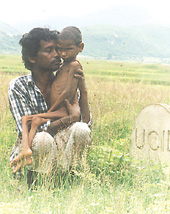 |
Animal’s People By Indra Sinha, Simon & Schuster, Rs 695
In Paradise Lost, Book IV, when Satan views the created universe for the first time, he finds among the living creatures “Two of far nobler shape, erect and tall,/ God-like erect…”
Beginning a review of Indra Sinha’s Animal’s People with a reference to Milton might seem a bit out of place. But Milton’s lines describing Adam and Eve as seen by Satan kept ringing in my ears as I read the fierce denials of Animal or Jaanvar, the protagonist and narrator of the novel, to humanhood. Animal believes that he forfeited the right to be called a human since the day he could no longer walk upright. Animal certainly has reasons to feel this way if one considers standing “erect and tall” as one of the distinguishing features of human beings.
But prepare yourself for a furious rebuff from Animal if you start feeling sorry for him on this account. He is profoundly cynical of all those who offer him sympathy, having heard and known them all. For Animal, all the “jarnaliss” who want him to tell his story are “like vultures”— “you come to suck our stories from us, so strangers in far off countries can marvel there’s so much pain in the world.”
The “stories” which Animal is so reluctant to put forward for the delectation of the reader are of “that night”. It was the night that blighted the lives of all Khaufpuris forever as noxious gases poured out of the chimneys of the “Kampani”. The gas that blinded the people, caused them to vomit blood and killed thousands, twisted the spine of Animal and started the voices in his head.
It is easy to guess that Khaufpur is the thinly disguised name for Bhopal and the “Kampani” stands for the Union Carbide factory, which ruined the lives of innumerable people in 1984 when poisonous gases leaked out of it. However, it is to Sinha’s credit that he does not allow the history of the Bhopal tragedy to get too much in the way of his tale. Khaufpur, with its urban squalor, its yawning divide between the rich and the poor, its evil ministers and its ineffective legal system is not simply Bhopal but any city on the map of India.
Sinha creates a seething, vibrant city in Khaufpur. It is a place most of whose inhabitants were crippled for life on that fateful night. The effect of the gas lingers down the generations as babies are born with handicaps and mothers’ milk is poisoned by the contaminated groundwater. Yet, unfazed, Khaufpur continues to resist the schemes of the Kampani to deny justice to the affected. The indomitable spirit of Khaufpur is personified in Animal who sprints about the city on his callused hands and feet, mouths obscenities, dreams of love, spies on naked women and converses with that part of his anatomy that ironically refuses to be anything but erect at the most inopportune moments.
Animal’s friends are these irrepressible children of the “Apokalis”. They include people like Zafar, the activist who almost fasts himself to death to bring justice to the Khaufpuris, his fiancée, Nisha, who also happens to be Animal’s object of desire, Nisha’s father, Pandit Somraj, the erstwhile Aawaaz-e-Khaufpur till that night took away his voice. There are other minor but equally unforgettable characters such as Ma Franci, Animal’s surrogate mother, who forgot all languages but her mother tongue, French, on that night, the ancient Huriya Bi, her blind husb- and, Hanif Ali, and their eight-year-old granddaughter, Aliya. All these and more make up the angry cacophony that is the voice of Khaufpur.
Sinha must be credited for the way in which he has mimicked the voice of Animal. There was always the risk of the novel slipping into the sentimental or the polemic mode because of the nature of the incident on which it is based. Sinha averts the danger by letting the anarchic yet naïve voice of Animal control the narrative. Animal belongs to the group that has nothing to lose since it has already lost everything. And he compels the genteel reader to join the devastated “Kingdom of the Poor”, which survives on Rs 4 a day, competes for food with starving dogs, endures unimaginable physical and emotional pain but cannot afford medical treatment. We read about the Bhopal disaster and forgot it when the tragedy lost its sensational content. Animal makes us acknowledge our callousness by taking us back to the world that still suffers its aftermath.
The endearing quality of the novel lies in the fact that it is not merely the reader who does all the learning. Animal also has much to learn — the most important of which is the lesson that he is a human being after all. Animal begins to suspect that he is more than an animal as the hope of walking straight one day, so that he can marry Nisha, gets stronger in him. His friend, Farouq, had warned him: “You pretend to be an animal so you can escape the responsibility of being human.” Animal ultimately comes to recognize his humanity in the love and protectiveness he feels not only for Nisha but even for his rival, Zafar, for the helpless Ma Franci and for Aliya, whose death he is unable to prevent.
Sinha has said in an interview that “In the end, the only way to deal with tragedy is to laugh at it”. It is difficult not to laugh at Animal’s language, rich with the choicest invectives in English, Hindi and French, his inability to control himself whenever he gets close to Nisha and his villainous attempt to drain Zafar of sexual desire by feeding him datura, which ironically makes him burn with urge. Animal defeats the designs of the Kampani — if not by walking erect at last, then by allowing his libido to get the better of him.











